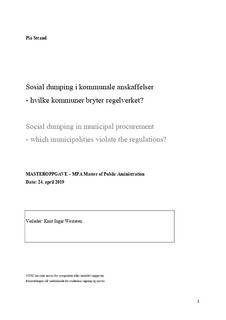| dc.contributor.advisor | Westeren, Knut Ingar | |
| dc.contributor.author | Strand, Pia | |
| dc.date.accessioned | 2019-08-21T14:03:48Z | |
| dc.date.available | 2019-08-21T14:03:48Z | |
| dc.date.issued | 2019 | |
| dc.identifier.uri | http://hdl.handle.net/11250/2609681 | |
| dc.description.abstract | Arbeidslivskriminalitet er en økende utfordring med alvorlige konsekvenser både for berørte arbeidstakere og virksomheter, og for arbeidsmarkedet og samfunnet forøvrig. Staten har gitt kommunene et viktig oppdrag – å utelukke virksomheter som gir sine arbeidstakere dårlige lønns- og arbeidsvilkår fra å utføre oppdrag for kommunene, et marked som utgjør nærmere to hundre milliarder kroner. Forskrifter pålegger kommunene å stille krav til lønns- og arbeidsvilkår i kontrakter med sine leverandører, samt å kontrollere at arbeidstakerne faktisk får disse vilkårene. Men kommunene gjør ikke alltid som de er pålagt, og problemstillingen undersøkelsen forsøker å svare på er “hva kjennetegner kommuner som ikke oppfyller forskriftskrav om innhold i og oppfølging av kontrakter med leverandører med mål om å hindre at kommunene bidrar til sosial dumping?”
De egenskapene ved kommunene jeg undersøker er kommunens størrelse, økonomiske handlingsrom og hvor mye tjenester en kommune kjøper, samt ordførerens politiske tilhørighet og om kommunen har vedtatt tiltak ut over de lovpålagte for å hindre arbeidslivskriminalitet i sine kontrakter.
For å identifisere de kommunene som bryter regelverket har jeg brukt resultater fra Arbeidstilsynets tilsyn med kommunenes etterlevelse av forskriftskravene i perioden 2013 til 2019, noe som gir pålitelige data, men et ikke et tilfeldig utvalg. Resultatene holdes opp mot data fra SSB og Kommunedatabasen, og en oversikt fra Fagforbundet over kommuner som har vedtatt særskilte tiltak for å unngå arbeidslivskriminalitet i sine anskaffelser. Resultatene er analysert ved hjelp av prinsipal-agentteori og teorier om anskaffelser og konkurranseutsetting, organisasjoners kapasitet og strukturelle forhold, og forholdet mellom staten og kommunene.
Resultatene gir ikke støtte til en hypotese om at god kommuneøkonomi eller mye erfaring med tjenestekjøp medfører bedre etterlevelse av forskriftskravene. I utvalget er kommuner som bryter regelverket i snitt større enn de som etterlever regelverket, noe som tyder på at store kommuner har utfordringer med regelverket tross mulige stordriftsfordeler som større fagmiljø. Kommuner med ordførere fra partier på venstresiden har færre brudd på reglene, som tyder på at kommunene i praksis finner handlingsrom til tross for påbud i regelverket. | |
| dc.description.abstract | Work related crime is an increasing challenge with severe consequenses for affected workers and businesses, and for the labour marked and society in general. The government has given the municipalities an important assignment – to exclude businesses offering poor wages and working conditions from providing services for the municipalites, a market amounting to 200 billion NOK. Regulations require the municipalities to include wages and working conditions as requirements in contracts with service providers, and to check whether these conditions are fulfilled. However, municipalities do not always do as required, and this study asks: “what characterizes municipalities that do not comply with regulations on the content and follow-up of contracts, with the aim to avoid social dumping in municipal contracts?”
The characteristics this study examines are the size of the municipalities, their financial leeway, the amount of services it buys, and the mayors political affiliation and whether the municipality has adopted measures beyond the statutory requirements to prevent work related crime in their contracts.
Results from the Labour Inspectorates inspections of the municipalites compliance og the regulations from 2013 to 2019 are used to identify the municipalities that do not comply. These are reliable data, but do not constitute a random selection. The data are held up against data from SSB and Norwegian center for Research Data, and a list from Fagforbundet of municipalities that have adopted measuers to prevent work related crime in their contracts. The results are analysed in the perspectives of principal agent theory and theories on procurement and competition, organizational capacity and structural conditions, and on the relationship between the state and the municipalities.
The results do not corroborate a hypothesis that a good financial situation or more extencive experience with procurement leads to more compliance. In the data, municipalities not in compliance are on average larger than those that are, implying that larger municipalites has challenges complying with the regulations that assumbed stronger competences do not relieve. Municipalities with mayors from the political left are more in compliance, implying that the municipalities in practice still chooses to what degree they will comply to the regulations. | |
| dc.language | nob | |
| dc.publisher | NTNU | |
| dc.title | Sosial dumping i kommunale anskaffelser - hvilke kommuner bryter regelverket? | |
| dc.type | Master thesis | |
